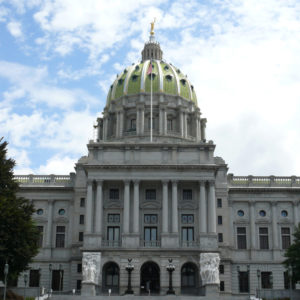Pennsylvania Gov. Tom Wolf introduced his final state budget plan in February.
He proposed $45.7 billion to increase general fund spending by $4.5 billion—a nearly 11 percent hike. Wolf made the argument that the state should increase spending on education by $1.55 billion, especially in poorer school districts.
His plan includes increasing the minimum wage, workforce development, veterans’ services and suicide prevention, and funding for environmental programs.
Wolf, a Democrat, recently asked the legislature to give Pennsylvanians $2,000 per household.
“The cost of everything from gas to groceries is a little higher right now than it was just a few weeks ago and for Pennsylvanians living paycheck to paycheck even a small increase in expenses can mean painful decisions like paying for food or rent,” said Wolf. “I see that pain in communities across Pennsylvania and I want to talk about solutions. I want to put $2,000 checks into the hands of Pennsylvanians and families that need it.”
However, Independent Fiscal Office (IFO), the nonpartisan financial watchdog, warned Pennsylvania could face as much as a $1.8 billion deficit by June 2024. And now the U.S. economy may be on the brink of a recession.
The deadline to adopt the budget is midnight June 30. But the issue of whether or how much of the $6 billion surplus and $1.7 billion pandemic relief funds to spend is a sticking point. Negotiations between Wolf and the Republican-led legislature are continuing.
“During the last three weeks of June we hope to finalize the 2022-2023 budget,” said Sen. Bob Mensch (R-Berks/Bucks/Montgomery). “While the governor seems intent to spend the state into debt, I and my Senate Republican caucus are determined to be fiscally responsible and we will fund our next budget without creating future debt, and thus avoid the future tax increases the governor’s proposal definitely create.
“In a time of hyperinflation and a pending recession, it would be irresponsible to create future economic chaos with a spendthrift budget.”
Rep. Chris Quinn (R-Media) agrees with the governor that more needs to be spent on public education.
“We must make another record-setting investment in public education, as we have in each of the last several years,” said Quinn. “There are learning deficits due to the COVID-related school closures that must be addressed if our kids are going to be prepared for success. With families challenged by runaway inflation, increased energy costs, and skyrocketing gas prices, we must craft a budget that does not further burden hardworking taxpayers.
“Finally, I’d like to see Growing Greener III be considered. Sponsored by Rep. Lynda Schlegel Culver (R-Northumberland/Snyder) and myself. The legislation would invest federal stimulus funds in projects to restore and protect our waterways, preserve open space, and upgrade drinking and wastewater facilities. That targeted investment promotes job growth and activity in tourism and agriculture, our top two industries which are vital to Pennsylvania’s economic well-being.”
Rep. Todd Stephens (R-Montgomeryville) said, “I’m focused on helping restore communities devastated by last year’s tornado, continuing our record-setting investments in our schools and protecting families from the long-term impact of the out-of-control price increases we’re experiencing every day.”
“As always, my top priorities for this budget season are families, education, and economic development,” Rep. Melissa Shusterman (D-Paoli). “Our state is currently sitting on an $8.5 billion dollar surplus. It’s time to start investing that money in hard-working Pennsylvanians, and Gov. Wolf has proposed a budget that will do just that. It includes a Child and Dependent Care tax credit, to reduce the financial burden of childcare on working families and would enable parents to rejoin the workforce without worrying about how to pay for expensive care.
“Additionally, the proposed budget includes increased investment in education, which will provide much-needed property tax relief for homeowners, as well as continuing to ensure our graduates are prepared for the jobs of tomorrow. Both priorities will holistically improve our state’s economic climate which will spur more business investment and create better-paying jobs,” said Shusterman.
But Rep. Tracy Pennycuick (R-Gilbertsville) urges caution on spending and recommends adding to the state’s savings account. Pennycuick is running for the Senate to replace Mensch, who is retiring.
“For the 2022-23 state budget, I would like to see priorities placed on additional funding for education and school security. I think we also need to dedicate more dollars to address our mental health crisis. Given the economic climate, it is vitally important we continue to put additional dollars in the state’s Rainy Day Fund to help offset any future economic downturns, as well as support our business community to bring down the cost of doing business and address inflation,” said Pennycuick.
Please follow DVJournal on social media: Twitter@DVJournal or Facebook.com/DelawareValleyJournal

